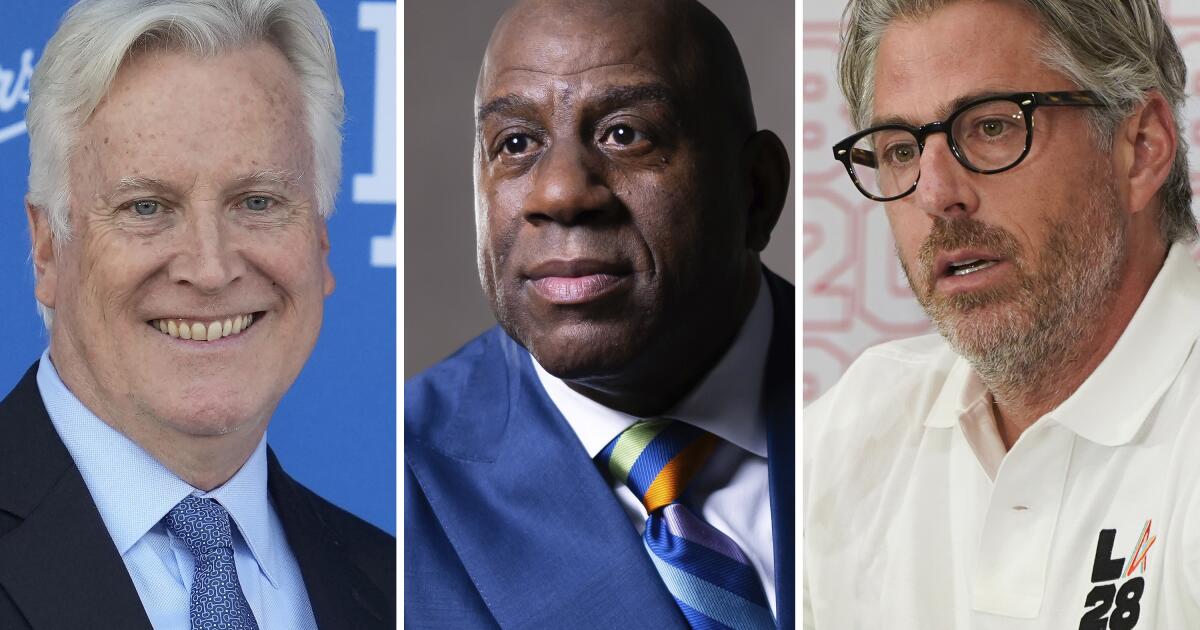Business
Newsom taps Magic Johnson, Casey Wasserman, Mark Walter to lead philanthropic L.A. fire recovery initiative

Gov. Gavin Newsom is tapping Magic Johnson, Dodgers Chairman Mark Walter and 2028 Olympics organizer Casey Wasserman to lead a new private-sector initiative to support wildfire recovery in Los Angeles.
The California governor’s office said the philanthropic effort, called LA Rises, will bring together business leaders to work with city, county and state officials to support rebuilding after the devastating fires. Walter, his foundation and the Los Angeles Dodgers Foundation will provide up to $100 million to jump-start fundraising.
“It’s not just about the state and federal government supporting local responses, it’s about the private sector, the civic society coming together,” Newsom said Tuesday, standing with Wasserman, Johnson and Dodgers Chief Executive Stan Kasten in the stadium parking lot overlooking the city. “It’s about active, engaged citizenship. It’s about people volunteering.”
The decision to lean on high-profile Angelenos outside government comes as state and local leaders face the monumental challenge of rebuilding the mixed-income community of Altadena and the wealthy Pacific Palisades neighborhood.
There will be enormous pressure on leaders to not just rebuild swiftly but also equally.
If the Palisades — where now-burned homes look out on sweeping ocean vistas and the newly homeless include enormously well-connected political donors — appears to be favored over the diverse enclave of Altadena, the disparity will undoubtedly become emblematic of the recovery efforts and potentially haunt Newsom’s political career.
Altadena is an unincorporated area, meaning its rebuilding effort will fall outside the purview of Mayor Karen Bass.
“My focus will be on Altadena because those people may be left behind and I want to make sure that that doesn’t happen,” Johnson said Tuesday.
The governor said he asked Johnson, the Hall of Fame Lakers point guard-turned-entrepreneur; Wasserman, an entertainment and sports executive; and Walter, the chief executive of the investment firm Guggenheim Partners and controlling owner of the Dodgers, to serve as co-chairs of the initiative because of their “proven leadership and deep commitment to Los Angeles.”
LA Rises will expand access to the philanthropic and private capital needed to rebuild in close coordination with government at all levels, come up with financing strategies to “close the gap between available resources and the cost to rebuild” and communicate information to residents, the governor’s office said.
Newsom’s new initiative comes weeks after Bass detailed her own plan to look outside City Hall to support recovery.
Bass appointed longtime civic leader and real estate developer Steve Soboroff to pilot the first phase of the city’s rebuilding efforts.
Soboroff, a onetime senior advisor to former Mayor Richard J. Riordan, also previously led the police commission and helped bring Crypto.com Arena (formerly Staples Center) to downtown Los Angeles.
As the city’s chief recovery officer, he will help build out the city’s plan for debris removal and streamlining rebuilding approvals and create a detailed program to rebuild parks and libraries, among other things.
Bass said her and Soboroff’s efforts would be closely coordinated with the governor’s office.
“Efforts to rebuild are underway in the City of Los Angeles and this announcement will be a vital component of a comprehensive effort to bring Angelenos home,” Bass said in a statement. “The number one question on the minds of Angelenos is about recovery and rebuilding.”
Wasserman, who worked with former Mayor Eric Garcetti to land the Olympics for the city, and Johnson, a part-owner of the Dodgers who has invested heavily in South L.A., have both long been involved in L.A. civic life.
“The private sector has to come together, both operationally and philanthropically, as part of the rebuild and in many ways, the rebirth of L.A.,” Wasserman said, noting that the Olympics will be welcoming the world to Los Angeles in 2028. “This process and this journey we’re about to start with LA Rises is not about the next month or the next year. This is about what L.A. is going to be like for the next 50 or 100 years.”
Newsom said Tuesday that community organizations had also received tens of millions of dollars in additional donations, including money from the Latino Community Foundation and the California Community Foundation. Kasten declined to specify Tuesday what “up to $100 million” meant, or if $100 million had been definitively pledged to LA Rises.
“The LA fires have wreaked havoc on LA’s neighborhoods,” Walter, who was not present Tuesday, said in a statement. “It’s time for those with means to come forward and make a positive impact to build back better.”

Business
California gas is pricey already. The Iran war could cost you even more

The U.S. attack on Iran is expected to have an unwelcome impact on California drivers — a jump in gas prices that could be felt at the pump in a week or two.
The outbreak of war in the Middle East, which virtually closed a key Persian Gulf shipping lane, spiked the price of a barrel of Brent crude oil by as much as $10, with prices rising as high as $82.37 on Monday before settling down.
The price of the international standard dictates what motorists pay for gas globally, including in California, with every dollar increase translating to 2.5 cents at the pump, said Severin Borenstein, faculty director of the Energy Institute at UC Berkeley’s Haas School of Business.
That would mean drivers could pay at least 20 cents more per gallon, though how much damage the conflict will do to wallets remains to be seen.
“The real issue though is the oil markets are just guessing right now at what is going to happen. It’s a time of extreme volatility,” Borenstein said. “We don’t know whether the war will widen or end quickly, and all of those things will drive the price of crude.”
President Trump has lauded the reduction of nationwide gas prices as a validation of his economic agenda despite worries about a weak job market and concerns of persistent inflation.
The upheaval in the Middle East could be more acutely felt in the state.
Californians already pay far more for gas than the rest of the country, with the average cost of a gallon of regular at $4.66, up 3 cents from a week ago and 30 cents from a month ago, according to AAA. The current nationwide average is about $3 per gallon.
The disruption in international crude markets also comes as refiners are switching to producing California’s summer-blend gas, which is less volatile during the state’s hot summers. The switch can drive up the price of a gallon of gas at least 15 cents.
The prices in California are largely driven by higher taxes and a cleaner, less polluting blend required year-round by regulators to combat pollution — and it’s long been a hot-button issue.
The politics were only exacerbated by recent refinery closures, including the Phillips 66 refinery in Wilmington in October and the idling and planned closure of the Valero refinery in Benicia, Calif., which reduced refining capacity in the state by about 18%.
California also has seen a steady reduction in its crude oil production, making it more reliant on international imports of oil and gasoline.
In 2024, only 23.3% of the crude oil refined in the state was pumped in California, with 13% from Alaska and 63% from elsewhere in the world, including about 30% from the Middle East, said Jim Stanley, a spokesperson for the Western States Petroleum Assn.
“We could see a supply crunch and real price volatility” if the Middle East supply is interrupted, he said.
The Strait of Hormuz in the Persian Gulf, through which about 20% of the world’s oil passes, was virtually closed Monday, according to reports. Though it produces only about 3% of global oil, Iran has considerable sway over energy markets because it controls the strait.
Also, in response to the U.S. attack, Iran has fired a barrage of missiles at neighboring Persian Gulf states. Saudi Arabia said it intercepted Iranian drones targeting one of its refinery complexes.
California Republicans and the California Fuels & Convenience Alliance, a trade group representing fuel marketers, gas station owners and others, have blamed Gov. Gavin Newsom’s policies for driving up the price of gas.
A landmark climate change law calls for California to become carbon neutral by 2045, and Newsom told regulators in 2021 to stop issuing fracking permits and to phase out oil extraction by 2045. He also signed a bill allowing local governments to block construction of oil and gas wells.
However, last year Newsom changed his stance and signed a bill that will allow up to 2,000 new oil wells per year through 2036 in Kern County despite legal challenges by environmental groups. The county produces about three-fourths of the state’s crude oil.
Borenstein said he didn’t expect that the new state oil production would do much to lower gas prices because it is only marginally cheaper than oil imported by ocean tankers.
Stanley said the aim of the law was to support the Kern County oil industry, which was facing pipeline closures without additional supplies to ship to state refineries.
Statewide, the industry supports more than 535,000 jobs, $166 billion in economic activity and $48 billion in local and state taxes, according to a report last year by the Los Angeles County Economic Development Corp.
Bloomberg News and the Associated Press contributed to this report.
Business
Block to cut more than 4,000 jobs amid AI disruption of the workplace

Fintech company Block said Thursday that it’s cutting more than 4,000 workers or nearly half of its workforce as artificial intelligence disrupts the way people work.
The Oakland parent company of payment services Square and Cash App saw its stock surge by more than 23% in after-hours trading after making the layoff announcement.
Jack Dorsey, the co-founder and head of Block, said in a post on social media site X that the company didn’t make the decision because the company is in financial trouble.
“We’re already seeing that the intelligence tools we’re creating and using, paired with smaller and flatter teams, are enabling a new way of working which fundamentally changes what it means to build and run a company,” he said.
Block is the latest tech company to announce massive cuts as employers push workers to use more AI tools to do more with fewer people. Amazon in January said it was laying off 16,000 people as part of effort to remove layers within the company.
Block has laid off workers in previous years. In 2025, Block said it planned to slash 931 jobs, or 8% of its workforce, citing performance and strategic issues but Dorsey said at the time that the company wasn’t trying to replace workers with AI.
As tech companies embrace AI tools that can code, generate text and do other tasks, worker anxiety about whether their jobs will be automated have heightened.
In his note to employees Dorsey said that he was weighing whether to make cuts gradually throughout months or years but chose to act immediately.
“Repeated rounds of cuts are destructive to morale, to focus, and to the trust that customers and shareholders place in our ability to lead,” he told workers. “I’d rather take a hard, clear action now and build from a position we believe in than manage a slow reduction of people toward the same outcome.”
Dorsey is also the co-founder of Twitter, which was later renamed to X after billionaire Elon Musk purchased the company in 2022.
As of December, Block had 10,205 full-time employees globally, according to the company’s annual report. The company said it plans to reduce its workforce by the end of the second quarter of fiscal year 2026.
The company’s gross profit in 2025 reached more than $10 billion, up 17% compared to the previous year.
Dorsey said he plans to address employees in a live video session and noted that their emails and Slack will remain open until Thursday evening so they can say goodbye to colleagues.
“I know doing it this way might feel awkward,” he said. “I’d rather it feel awkward and human than efficient and cold.”
Business
WGA cancels Los Angeles awards show amid labor strike

The Writers Guild of America West has canceled its awards ceremony scheduled to take place March 8 as its staff union members continue to strike, demanding higher pay and protections against artificial intelligence.
In a letter sent to members on Sunday, WGA West’s board of directors, including President Michele Mulroney, wrote, “The non-supervisory staff of the WGAW are currently on strike and the Guild would not ask our members or guests to cross a picket line to attend the awards show. The WGAW staff have a right to strike and our exceptional nominees and honorees deserve an uncomplicated celebration of their achievements.”
The New York ceremony, scheduled on the same day, is expected go forward while an alternative celebration for Los Angeles-based nominees will take place at a later date, according to the letter.
Comedian and actor Atsuko Okatsuka was set to host the L.A. show, while filmmaker James Cameron was to receive the WGA West Laurel Award.
WGA union staffers have been striking outside the guild’s Los Angeles headquarters on Fairfax Avenue since Feb. 17. The union alleged that management did not intend to reach an agreement on the pending contract. Further, it claimed that guild management had “surveilled workers for union activity, terminated union supporters, and engaged in bad faith surface bargaining.”
On Tuesday, the labor organization said that management had raised the specter of canceling the ceremony during a call about contraction negotiations.
“Make no mistake: this is an attempt by WGAW management to drive a wedge between WGSU and WGA membership when we should be building unity ahead of MBA [Minimum Basic Agreement] negotiations with the AMPTP [Alliance of Motion Picture and Television Producers],” wrote the staff union. “We urge Guild management to end this strike now,” the union wrote on Instagram.
The union, made up of more than 100 employees who work in areas including legal, communications and residuals, was formed last spring and first authorized a strike in January with 82% of its members. Contract negotiations, which began in September, have focused on the use of artificial intelligence, pay raises and “basic protections” including grievance procedures.
The WGA has said that it offered “comprehensive proposals with numerous union protections and improvements to compensation and benefits.”
The ceremony’s cancellation, coming just weeks before the Academy Awards, casts a shadow over the upcoming contraction negotiations between the WGA and the Alliance of Motion Picture and Television Producers, which represents the studios and streamers.
In 2023, the WGA went on a strike lasting 148 days, the second-longest strike in the union’s history.
Times staff writer Cerys Davies contributed to this report.
-

 World5 days ago
World5 days agoExclusive: DeepSeek withholds latest AI model from US chipmakers including Nvidia, sources say
-

 Massachusetts6 days ago
Massachusetts6 days agoMother and daughter injured in Taunton house explosion
-

 Denver, CO6 days ago
Denver, CO6 days ago10 acres charred, 5 injured in Thornton grass fire, evacuation orders lifted
-

 Louisiana1 week ago
Louisiana1 week agoWildfire near Gum Swamp Road in Livingston Parish now under control; more than 200 acres burned
-

 Technology1 week ago
Technology1 week agoStellantis is in a crisis of its own making
-

 Oregon4 days ago
Oregon4 days ago2026 OSAA Oregon Wrestling State Championship Results And Brackets – FloWrestling
-

 Technology1 week ago
Technology1 week agoArturia’s FX Collection 6 adds two new effects and a $99 intro version
-

 News1 week ago
News1 week agoVideo: How Lunar New Year Traditions Take Root Across America
















